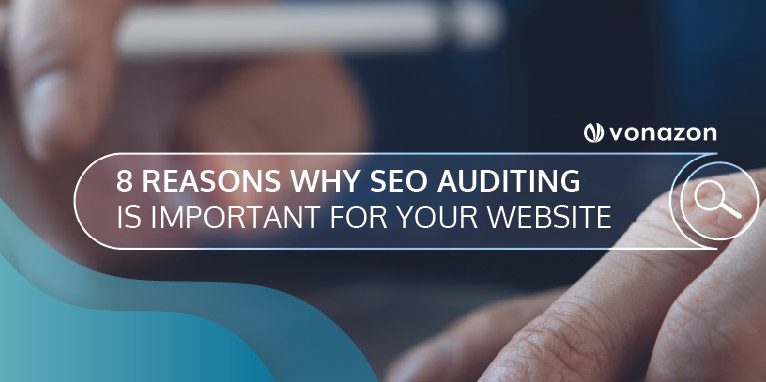
8 Reasons Why You Need an SEO Audit for Your Website
SEO audits are a crucial part of digital marketing and should be a fundamental element of your content marketing strategy. But you may ask, what is an SEO audit and why do I need one? An SEO audit is a comprehensive analysis of how well your website is performing from a search engine perspective. Basically, these audits how much traffic you are getting from web searches and how you can improve organic search numbers. This comprehensive assessment evaluates both major and minor issues with your site that can significantly impact your site content’s searchability. SEO auditing identifies not only weaknesses but also strengths that, when factored into your content strategy, can lead to your website’s long-term success.
SEO Auditing Benefits
The benefits of SEO auditing are many, where this analysis provides your company website’s health status. Like medical check-ups, you should do SEO auditing at regular intervals to catch any issues you can fix to promote your website’s long-term viability. Through regular auditing, you can continually:
- Optimize your visibility in search rankings
- Enhance your site’s usability
- Convert more potential customers
It is important to note that SEO auditing is not something to put off or dismiss, and it is not something you should do just once and then never again. The following are several reasons to perform SEO auditing.
Reasons why You Need to Perform an SEO Audit
1. Benchmarking
With regular SEO auditing as part of your content strategy, you can set benchmarks for goals you make and measure your progress in meeting those goals. You can find out more quickly in your campaign what is working and what is not working, and you can see how you are improving on a month-to-month basis. When you find out what is not working through SEO auditing instead of later down the road, it is easier to undo it.
There are many ways to benchmark your SEO, including benchmarking the number of pages on your site indexed by Google and knowing what they look like on Google to get an overall picture of what your website looks like to potential customers. You can also benchmark your site’s link authority, which quantifies to how many reputable, quality sites your website links. These are practical ways you can measure incremental progress in a shorter amount of time.
2. Outdated Content
Conducting an SEO audit can help you identify outdated content. The larger your website becomes, you increase the amount of content, where it is possible to overlook outdated content. This outdated content can negatively impact your search ranking. Crawlers need a reason to prioritize indexing your site, and that reason can be new, quality content. If your content is not getting hits for months, you may need to rework the content or delete it. Remember that content drives engagement, trust, and authority, all of which boost search rankings. Keywords are essential, but you must incorporate them with natural language, or Google could penalize your search ranking.
3. Website Loading Time
An SEO audit can evaluate website loading time. Website loading time is a pivotal factor in how your site ranks in searches. The ideal loading time is 1 to 2 seconds, and the average person will wait three seconds before moving on to the next location. Google aims for half a second loading time, but there are still actions you can take on your end to promote a faster loading time.
You can evaluate your pages’ loading time with Google’s PageSpeed Insights. SEO auditing can identify measures to increase loading speed, such as:
- Enabling compression of files
- Optimizing code
- Minimizing redirects
- Optimizing file size of images
4. Mobile Compatibility
Google now ranks and indexes your website’s mobile version first, based on how it performs on mobile devices. Therefore, the right SEO audit will evaluate the performance of your mobile site as well. Having a fully compatible mobile version of your website has a massive impact on your SEO and improves users’ perception of your company. If you are creating a new website, you should design the mobile version first. If you already have the website first, try Google’s Mobile-Friendly Test tool to see how your website is already faring with mobile compatibility before making any changes.
5. Website Traffic Insights
Using Google Analytics and Google Search Console, you can gain valuable insights into your website’s traffic. You can know how much engagement your website generates through search volume, URL clicks, and conversion rates. Increasing numbers are a vital sign that your content strategy is working. With Google Analytics, you can also measure:
- Organic traffic by looking at one channel at a time
- Overall traffic for a specific period
- Traffic going to each page
- Traffic per campaign
You can use Google Tag Manager to add a pixel to your website to track more specific traffic activities.
6. Algorithm Changes
SEO auditing is critical to adjust for frequent changes to Google’s algorithm. Many changes are minor and will not impact traffic to your site and search rankings, but any significant change can cause your numbers to drop. Just in 2020 alone, Google had eight major algorithm updates. All search engines constantly update each respective algorithm to improve user searches, so regular SEO auditing helps monitor these changes, identify how each change impacts your SEO, and adjust for them.
How Often Does Google Update Search Listings
7. Website Errors
Any error messages or broken links can impact the perceived quality of your site to search engines. An SEO audit can find these issues so you can correct them. Errors to fix like these are the low-hanging fruit; they are often easy to fix and can help you recover lost traffic. Sometimes the broken links are due to the content being taken down on another website, where regular SEO auditing is essential to identify these changes as soon as possible. An additional way of improving the quality of your site is to improve navigability by inserting internal links. Again, the proper and correct usage of all links on your site directly contributes to your search ranking.
8. Titles and Meta Data
When your site’s content shows up in search engine results, it is essential to control how the information is written and displayed. First impressions are everything, where title tags and meta descriptions can be the first thing users see when they view your search listing. You want title tags and metadata to be relevant and capture enough content that users will click on and engage with your site. Crawlers can identify pre-existing content for titles and metadata. Once you can view this existing content, then you can determine how to improve it. Remember that titles, metadata, and any headline must include the keyword.
The benefits of doing an SEO audit are vast. At Vonazon, we perform routine, comprehensive SEO audits for many of our clients, and this regular auditing promotes long-term success for driving online traffic to your website. Call us today to get started with your first SEO audit.






